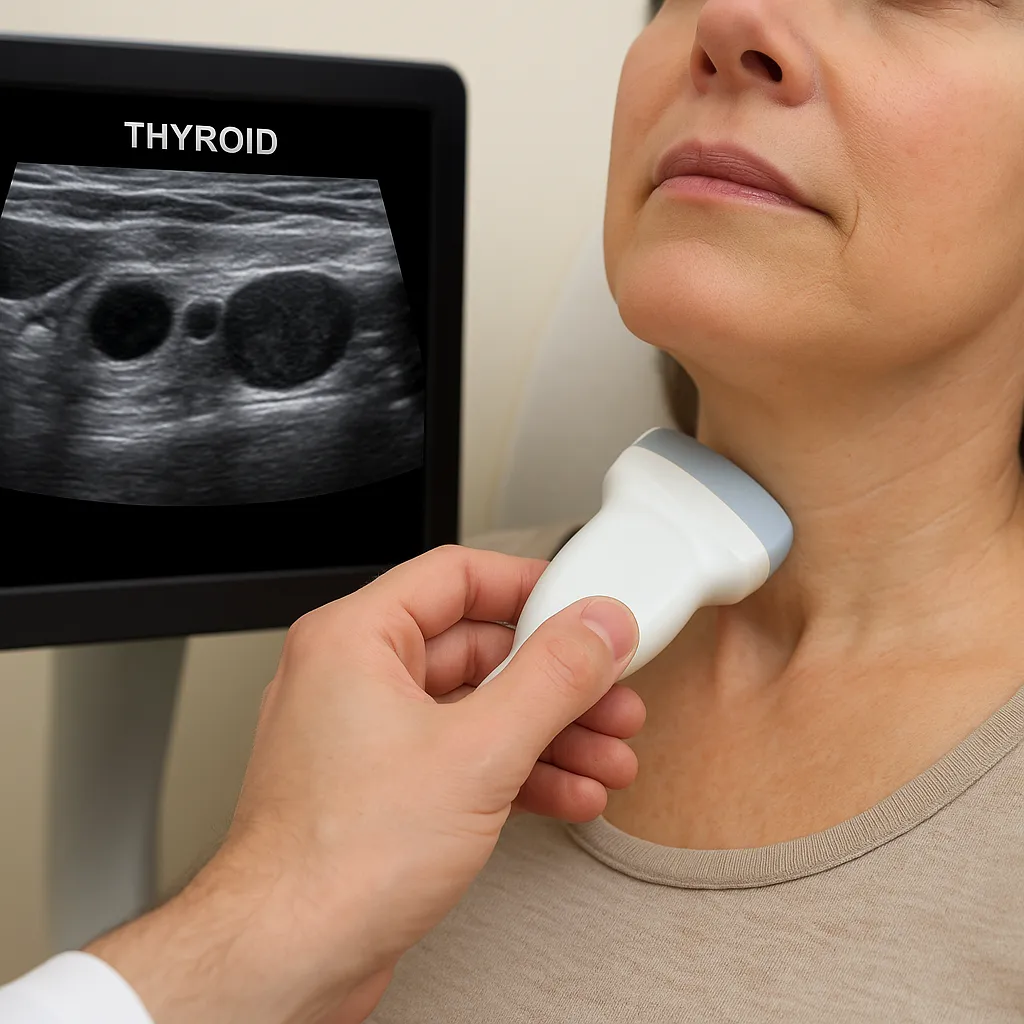
Seeing Is Believing: The Benefits of Ultrasound for Patients and Providers

What’s a Thyroid Goiter? Get the Facts
What’s a Thyroid Goiter? Get the Facts
Your thyroid plays a big role in how your body works — even though it's small and butterfly-shaped. When something goes wrong with it, like developing a goiter, it can affect everything from your energy levels to how fast your heart beats. But what exactly is a goiter, and should you be worried?
Let’s break it down in simple, easy-to-understand terms.

What Is a Thyroid Goiter?
A goiter is an abnormal enlargement of your thyroid gland, which is located at the front of your neck, just below your Adam’s apple. It’s not a disease itself, but a sign that something is wrong with the thyroid.
Goiters can be small and harmless — or they can grow large enough to be noticeable and cause discomfort. They might appear as a visible swelling or feel like a lump in your throat.
Common Symptoms of a Goiter
Some goiters don’t cause any symptoms, while others can lead to:
A noticeable swelling in the neck
A tight feeling in the throat
Difficulty swallowing or breathing
Hoarseness or voice changes
Frequent coughing (not due to a cold)
If the goiter is associated with changes in thyroid function, you might also notice symptoms of hyperthyroidism (overactive thyroid) or hypothyroidism (underactive thyroid).
What Causes a Goiter?
There are several reasons your thyroid might enlarge:
1. Iodine Deficiency
Your thyroid needs iodine to make hormones. If you don’t get enough in your diet, your thyroid may enlarge in an effort to compensate.
2. Autoimmune Diseases
Graves’ disease: Causes your thyroid to become overactive.
Hashimoto’s thyroiditis: Causes inflammation and an underactive thyroid.
Both conditions can lead to goiter formation.

3. Hormonal Changes
Goiters are more common during pregnancy, menopause, or puberty, when hormone levels are shifting.
4. Thyroid Nodules or Cysts
Lumps or fluid-filled sacs can cause part of the thyroid to swell.
5. Thyroid Cancer (Rare)
Most goiters are benign, but in rare cases, they can be linked to cancerous growths.
How Is a Goiter Diagnosed?
At Atlanta Ultrasound, we use thyroid ultrasound imaging to take a closer look at the structure of your thyroid. This safe, non-invasive scan helps:
Detect the size and shape of the thyroid
Identify nodules or cysts
Determine if the goiter needs further evaluation
A thyroid ultrasound can guide your doctor in making decisions about blood tests, biopsies, or treatments.
Treatment Options
Treatment depends on what’s causing the goiter and how big it is:
Watchful waiting for small, symptom-free goiters
Medication to balance thyroid hormone levels
Radioactive iodine therapy to shrink an overactive thyroid
Surgery in rare cases where the goiter causes breathing/swallowing problems or may be cancerous
When to See a Doctor
If you notice a lump in your neck or experience symptoms like difficulty breathing or swallowing, don’t wait. It’s always better to get it checked early.
At Atlanta Ultrasound, we’re here to support you with compassionate care and expert imaging that gives you clarity and peace of mind.
Final Thoughts
A thyroid goiter may sound scary, but most cases are manageable with the right care and information. Whether it’s due to iodine deficiency, hormones, or something else, your health journey begins with getting the facts.
For those seeking expert ultrasound services, Atlanta Ultrasound offers quick, efficient, and comprehensive scans. Our team of skilled professionals is dedicated to providing you with the clarity and care you need.
Contact us today to schedule your ultrasound scan and take a decisive step towards understanding your health.
📍 Multiple locations in Metro Atlanta, GA
📞 Contact: 678-590-3300
🌐 Website: www.atlantaultrasound.com
Disclaimer: The content of this blog post, authored by a sonographer, is provided for educational and informational purposes only. It is not intended as medical advice, nor should it substitute for professional medical consultation, diagnosis, or treatment. Always seek the advice of your physician or other qualified health providers with any questions you may have regarding a medical condition or health concerns.
